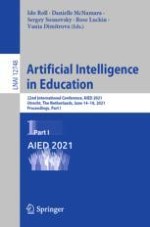2021 | OriginalPaper | Buchkapitel
“Can You Clarify What You Said?”: Studying the Impact of Tutee Agents’ Follow-Up Questions on Tutors’ Learning
verfasst von : Tasmia Shahriar, Noboru Matsuda
Erschienen in: Artificial Intelligence in Education
Aktivieren Sie unsere intelligente Suche, um passende Fachinhalte oder Patente zu finden.
Wählen Sie Textabschnitte aus um mit Künstlicher Intelligenz passenden Patente zu finden. powered by
Markieren Sie Textabschnitte, um KI-gestützt weitere passende Inhalte zu finden. powered by
